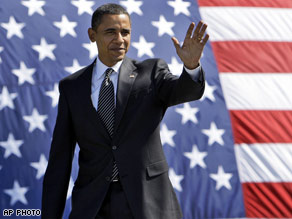Pakistanis see little change after Obama's victory
 Wednesday Islamabad - As celebrations erupted in many parts of the world over the victory of Democratic presidential candidate Barack Obama, people in Pakistan, a key US ally in the fight against terrorism, remained generally indifferent and even apprehensive.
Wednesday Islamabad - As celebrations erupted in many parts of the world over the victory of Democratic presidential candidate Barack Obama, people in Pakistan, a key US ally in the fight against terrorism, remained generally indifferent and even apprehensive.
"What difference does it make for us? His victory can be good for America, perhaps for many people around the world. But for us, he seems as bad as Bush," said Bilal Ahmad, 35, a shopkeeper in Islamabad's main commercial centre, known as the Blue Area.
Almost every news channel in the Islamic country covered the moving victory speech of the US president-elect, but Obama's repeated threats during the election campaign to bomb high-value targets inside Pakistan did not vanish from the people's mind.
"For us, whoever becomes the president of America, he will be against the Muslims. American attacks (airstrikes) will continue to kill our women and children, even under Obama. This is what he has promised to his nation," said Ishtiaq Hussein, 25, a student at Quaid-i-Azam University.
Hussein was not even impressed by the fact that Obama had the same Muslim middle name as his last.
Obama's statements during the election campaign only reinforced anti-American sentiments in dominantly conservative Pakistan.
Hundreds of college and university students from the capital and its adjoining garrison city of Rawalpindi participated in a rally arranged by the largest Islamist party, Jamaat-i-Islami, on the eve of the US election.
They chanted slogans like "Down with Bush, down with Obama" and "Jihad is the only way to deal with USA."
The relations between Pakistan and United States have already been strained in recent months because of intensified drone aircraft attacks on suspected Taliban and al-Qaeda fighters launching cross-border attacks from Pakistani tribal regions on US-led international forces in Afghanistan.
Collateral damage has increased pressure on the new civilian government in Islamabad to review its alliance with the US against the fight against terrorism, forged after al-Qaeda attacks in New York in September 2001.
Obama's comments only added to the difficulties of the government led by President Asif Ali Zardari, who is trying to accumulate popular support against the rising Islamic militancy.
He told the visiting head of the US Central Command General David Petraeus earlier this week that the attacks were counterproductive, warning him that the government was "under pressure to react more aggressively" against the attacks.
Obama's promise of revising the policies of outgoing president George W Bush, however, stirred some hopes among the liberal Pakistani intelligentsia.
"The bullish element in the Obama mix as such stays intact, but given that he has also mentioned closing down the notorious Guantanamo Bay prison, his policies may well offer more that is good than bad," said an editorial in the English-language daily The News.
"Perhaps the attacks on the basis of race and religion he has personally been subjected to throughout an abrasive election campaign, during which insinuations and accusations regarding his alleged link to Islam and to terrorists have repeatedly surfaced, will have sensitized him to the sentiments of Muslims who have frequently been made victims of similar bias," it said.
Many in Pakistan also received with appreciation Obama's vows to help resolve the Kashmir issue, which has been a prime source of Islamic militancy in the region.
"We should probably try to facilitate a better understanding between Pakistan and India and try to resolve the Kashmir crisis so that they can stay focussed not on India, but on the situation with those militants (Taliban)," said Obama in an interview to MSNBC over the weekend.
Hasan Askari Rizvi, a leading Pakistani commentator and visiting scholar at the John Hopkins School of Advanced International Studies in Washington, said the statement showed the US president-elect "has an understanding of the root causes of terrorism and he is willing to address those."
Pakistan has been reluctant to abandon state-level support for Jihadi organization just because of Kashmir issue. "When this problem is resolved ... the world would see Pakistani forces going all-out against the militants," he added.
According to Rizvi, Obama should understand that the security issues, whether in Pakistan or Afghanistan, cannot be addressed only through military means.
"The permanent solution is a comprehensive approach that lays stress on delicate diplomacy in the region as well as social development in the conflict areas, the aspects which were actually ignored by the outgoing US administration," he said.
"This change of approach would help in diluting anti-American sentiment in Pakistan and improving Obama's image." (dpa)